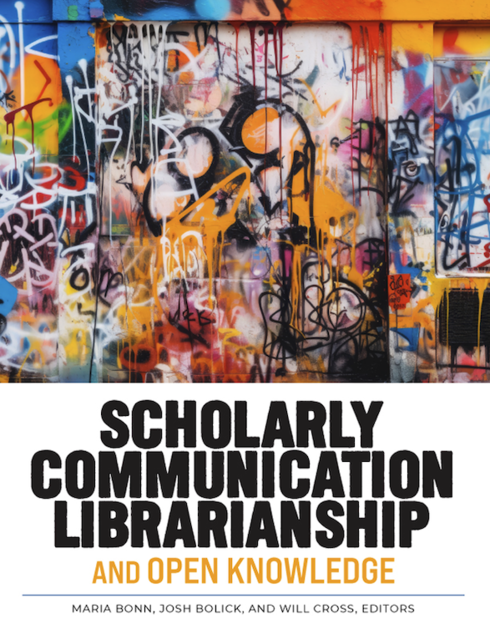
Scholarly Communication Librarianship and Open Knowledge
No ratings
Maria Bonn, University of Illinois Urbana Champaign
Josh Bolick, University of Kansas
Will Cross, North Carolina State University
Copyright Year: 2023
Publisher: Association of College and Research Libraries
Language: English
Formats Available
Conditions of Use
![]() Attribution-NonCommercial
Attribution-NonCommercial
CC BY-NC
Table of Contents
- Preface
- Foreword: ScholComm Is Rad
- Part I. What is Scholarly Communication?
- Part II. Scholarly Communication and Open Culture
- Part III. Voices from the Field: Perspectives, Intersctions, and Case Studies
- Conclusion: Adding Your Voice to the Conversation
Ancillary Material
Submit ancillary resourceAbout the Book
The intersection of scholarly communication librarianship and open education offers a unique opportunity to expand knowledge of scholarly communication topics in both education and practice. Open resources can address the gap in teaching timely and critical scholarly communication topics—copyright in teaching and research environments, academic publishing, emerging modes of scholarship, impact measurement—while increasing access to resources and equitable participation in education and scholarly communication.
Scholarly Communication Librarianship and Open Knowledge is an open textbook and practitioner’s guide that collects theory, practice, and case studies from nearly 80 experts in scholarly communication and open education. Divided into three parts:
- What is Scholarly Communication?
- Scholarly Communication and Open Culture
- Voices from the Field: Perspectives, Intersections, and Case Studies
The book delves into the economic, social, policy, and legal aspects of scholarly communication as well as open access, open data, open education, and open science and infrastructure. Practitioners provide insight into the relationship between university presses and academic libraries, defining collection development as operational scholarly communication, and promotion and tenure and the challenge for open access.
About the Contributors
Authors
Maria Bonn is an Associate Professor and Director of the MS in Library and Information Science program in the School of Information Sciences at the University of Illinois Urbana Champaign. Her research and teaching focuses on academic librarianship and the role of libraries in scholarly communication and publishing. She served as the associate university librarian for publishing at the University of Michigan Library, with responsibility for publishing and scholarly communications initiatives, including Michigan Publishing. She has also been an assistant professor of English at institutions both in the United States and abroad. She received a bachelor’s degree from the University of Rochester, master’s and doctoral degrees in American literature from SUNY Buffalo, and a master’s in information and library science from the University of Michigan.
Josh Bolick is the head of the David Shulenburger Office of Scholarly Communication and Copyright at the University of Kansas and a colead editor of this book and related projects. He advocates for open access, authors’ rights, open education, and issues related and is interested in OER as a vehicle for expanding scholarly communication knowledge and expertise. Josh holds a bachelor’s degree from the University of North Carolina Wilmington and a master’s in library and information studies from Florida State University.
Will Cross is a medium-sized pile of diplomas in a trench coat. He serves as the Director of the Open Knowledge Center at N.C. State University, an instructor at UNC Chapel Hill, and a Senior Policy Fellow at American University’s Washington College of Law. His current research on harmonizing copyright literacy in open knowledge communities is supported by grants from the IMLS, the Hewlett Foundation, and LYRASIS. In 2023 he conducted research on copyright literacies in European open science communities as a Fulbright Schuman Innovation Fellow.
